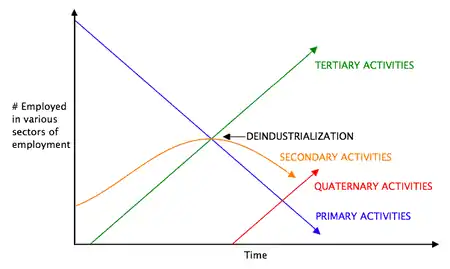Quaternary sector of the economy
| Economic sectors |
|---|
| Three-sector model |
|
Primary sector: raw materials Secondary sector: manufacturing Tertiary sector: services |
| Additional sectors |
|
Quaternary sector: information services Quinary sector: human services |
| Theorists |
| AGB Fisher · Colin Clark · Jean Fourastié |
| Sectors by ownership |
| Business sector · Private sector · Public sector · Voluntary sector |
The quaternary sector of the economy is a classification associated with extensions to the three-sector model in which the primary, secondary and tertiary sectors combine to produce goods from raw materials and distribute them to final consumers.
In the extended model, the quaternary sector describes the knowledge-based[1] part of the economy, which typically includes knowledge-oriented economic sectors such as information technology; media; research and development; information-based services such as information-generation and information-sharing; and knowledge-based services such as consultation, education, financial planning, blogging, and designing.[2]
According to some definitions, the quaternary sector includes other pure services, such as the entertainment industry, and the term has been used to describe media, culture, and government. Alternatively, pure services may be classified into an additional quinary sector.
Contrary to the implication in the name, the quaternary sector does not process the output of the tertiary sector. It is a part of the service sector with only limited connections to the industrial economy characterized by the three sector model.

.jpg.webp)
The quaternary sector further delineates the three-sector hypothesis of industry where the quaternary sector refers to a part of the tertiary sector along with the quinary economic sector. Intellectual services are sometimes regarded as distinct enough to warrant a separate sector and not be considered merely as a part of the tertiary sector. This sector evolves in well-developed countries where the primary and secondary sectors are a minority of the economy, and requires a highly educated workforce.[3]
The tertiary and quaternary sectors form the largest part of the UK economy, employing 76% of the workforce. The number of people who earn their living in these activities is increasing.
See also
References
- Tor Selstad (1990). "The rise of the quaternary sector. The regional dimension of wisdom or knowledge-based services in Norway, 1970–1985 - Norsk Geografisk Tidsskrift - Norwegian Journal of Geography - Volume 44, Issue 1". informaworld.
... knowledge-based services ...
- Peter Busch (1967). "Tacit Knowledge in Organizational Learning". Tacit Knowledge in Organizational Learning. ISBN 9781599045030. Retrieved 2010-06-17.
see page .. The quaternary sector of industry is the sector of industry that involves the intellectual services. That is research, development, and information.
- "ICTs, industry and the new teacher model". Asian Correspondent. 2010-06-17. Archived from the original on July 30, 2012. Retrieved 2015-09-09.
In Australia, the service sector accounts for 70 per cent of the country's economic activity. Within the service sector, however, more intellectual activities such as government, education, culture and media, can be further defined as the 'quaternary' sector of the economy. These activities are typically not measured in monetary value but they significantly contribute to the economy.